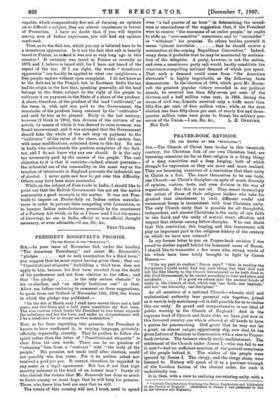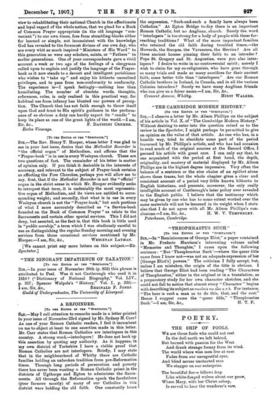PRAYER-BOOK REVISION.
[To THE EDITOR OP THE *SPEOTATOR."] Sit,—The Church of Christ here to-day in this twentieth century, the Christian folk of our own Christian land, are becoming conscious (so far as their religion is a living thing) of a deep conviction and a deep longing, both of which struggle for expression as they are more and more realised. They are becoming, conscious of a conviction that their unity in Christ is a fact. The know themselves to be one body, one Church—as Christ's disciples—in spite of much diversity of opinion, custom, taste, and even division in the way of organisation. But this is not all. They resent increasingly the action of those of their religious leaders who take for granted that attachment to such different credal and ceremonial forms is inconsistent. with true Christian unity. The only Church unity that is possible for all thoughtful, independent, and sincere Christians is the unity of one faith
in one Lord, and the unity of mutual trust, affection, and respect that obtains among fellow-disciples. Who can doubt that this conviction, this longing, and this resentment will play an important part in the religious history of the century on which we have now entered ?
In my former letter to you on Prayer-book revision I was proud to shelter myself behind the honoured name of Bacon. I should like to transcribe a few more wise, strong words of his which have been lately brought to light by Canon Henson :— " I for my part do confess," Bacon says,* "that in reading the Scriptures I could never find any such thing, but that God had left the like liberty to the Church Government as he hath clone to the Civil Government, to be varied according to time and place and
accidents It is good we return into the ancient bonds of uaencityeinthe Church of God, which was 'one faith, one baptism,' and not 'one hierarchy, one discipline.' "
As all members of a national Church—wherein civil and ecclesiastical authority bear parental rule together, joined as it were in holy matrimony—it is still possible for us to realise this our unity. So grand and comprehensive is our ideal of public worship in. the Church of England ! And in the supreme head of Church and State alike we have just now in this favoured country one who is allowed at alll hands to have
a genius for peacemaking. God: grant that he may not let a great, an almost unique, opportunity slip, now that-he has given Letters of Business to Convocation with a view to Prayer- book revision. The balance clearly needs.readjustment. The settlement of the Church under James I.—who can fail to see it now 2—had no sufficient sanction of the general conscience of the people behind it. The wishes of the people were ignored by James L The clergy, and the clergy. Alone, were listened to. History will speak of it as a partisan triumph
of the Laudian faction of the clerical order, for such it undoubtedly was.
It is, then, with a view to realising our existing unity, with a
• "Certain Considerations Touching the Better Pacification and Edification ' of the Church of England." (Dedicated to James I. 'and presented to him on his entrance into England-)
view to rehabilitating their national Church in the affectionate and loyal regard of the whole nation, that we plead for a Book of Common Prayer appropriate (in the old language "con- venient ") to our own times, free from stumbling-blocks either for learned or simple, not inconsistent with the knowledge God has revealed to the foremost divines of our own day, who are every whit as much inspired "Ministers of His Word" to this generation as were any scholars, saints, or "Fathers" to earlier generations. One of your correspondents gave a vivid account a week or two, ago of the feelings of a clergyman called upon to explain and justify the language of the Prayer- book as it now stands to a devout and intelligent parishioner who wishes to " take up " and enjoy his hitherto unrealised privileges, and to pass from non-conformity to conformity. The experience is—I speak feelingly—nothing less than humiliating. The number of obsolete words, thoughts, references, rules, is only realised in this practical way, for habitual use from infancy has blunted our powers of percep- tion. The Church that has not faith enough to throw itself upon God and trust to His spirit's guidance in the perform- ance of so obvious a duty can hardly expect its " candle " to keep its place as one of the great lights of the world.—I am,











































































 Previous page
Previous page